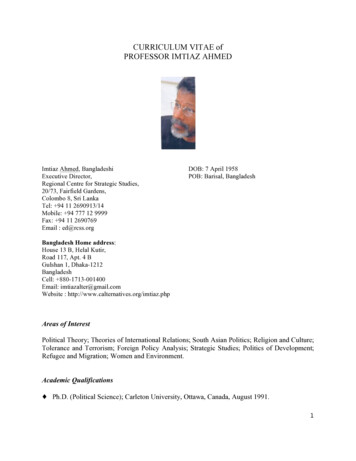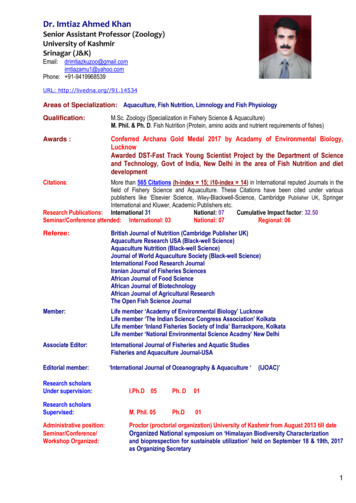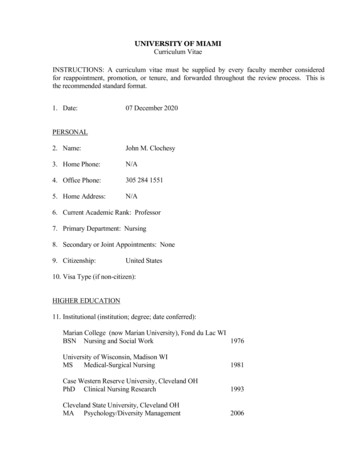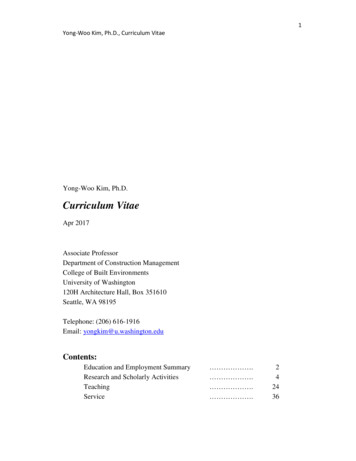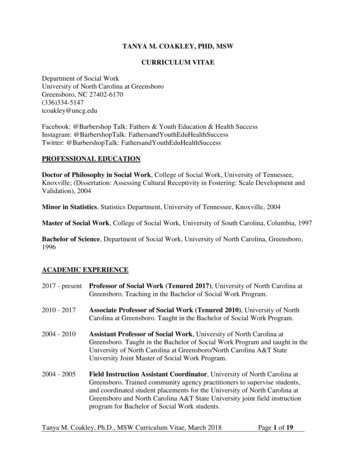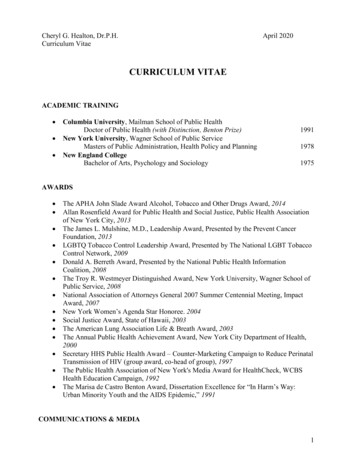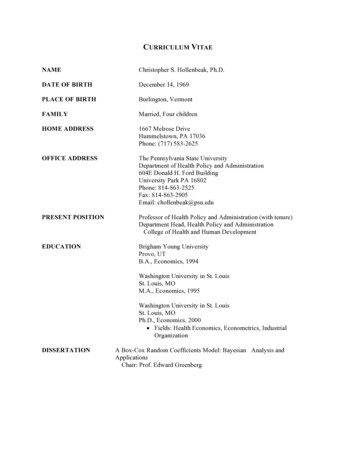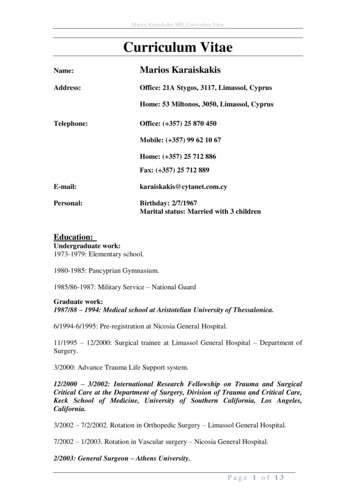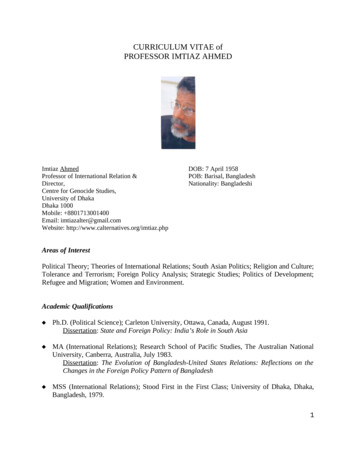
Transcription
CURRICULUM VITAE ofPROFESSOR IMTIAZ AHMEDImtiaz AhmedProfessor of International Relation &Director,Centre for Genocide Studies,University of DhakaDhaka 1000Mobile: 8801713001400Email: imtiazalter@gmail.comWebsite: http://www.calternatives.org/imtiaz.phpDOB: 7 April 1958POB: Barisal, BangladeshNationality: BangladeshiAreas of InterestPolitical Theory; Theories of International Relations; South Asian Politics; Religion and Culture;Tolerance and Terrorism; Foreign Policy Analysis; Strategic Studies; Politics of Development;Refugee and Migration; Women and Environment.Academic Qualifications Ph.D. (Political Science); Carleton University, Ottawa, Canada, August 1991.Dissertation: State and Foreign Policy: India’s Role in South Asia MA (International Relations); Research School of Pacific Studies, The Australian NationalUniversity, Canberra, Australia, July 1983.Dissertation: The Evolution of Bangladesh-United States Relations: Reflections on theChanges in the Foreign Policy Pattern of Bangladesh MSS (International Relations); Stood First in the First Class; University of Dhaka, Dhaka,Bangladesh, 1979.1
BSS (Honours) (International Relations); Stood First in the First Class; University of Dhaka,Dhaka, Bangladesh, 1978. Junior Certificate in French, in First Division; University of Dhaka, Dhaka, Bangladesh,1977. Higher Secondary Certificate, in First Division, stood 9th in the merit list in the DhakaBoard; Dhaka College, Dhaka, Bangladesh, 1975. Secondary School Certificate, in First Division; Residential Model School, Dhaka,Bangladesh, 1973.Fellowship Ford Foundation Fellow, Oxford Centre for Islamic Studies, University of Oxford, October2004-July 2005. Asia Fellow at the Centre for the Study of Developing Societies (CSDS), Delhi, AsianScholarship Foundation, Bangkok, Thailand; February-September 2004. Rockefeller Fellow, Rockefeller Foundation at the Bellagio Study and Conference Centre,Bellagio, Italy; August-September 2002. Japan Foundation Fellow, Yokohama City University, Yokohama, Japan; October 1996 September 1997. Research Fellow, Institute of Southeast Asian Studies, Heng Mui Keng Terrace, PasirPanjang, Singapore 0511; May - June 1995. Foreign Policy Fellow, School of Public Affairs, University of Maryland at College Park,Maryland-20742, U.S.A.; January - May 1993.Awards & Scholarships SSRC Award on International Conflict Zones, Program on Global Security & Cooperation,Social Science Research Council, New York, September 2001-March 2002. Distinguished Leadership Award, American Biographical Institute, North Carolina, USA,October 1997. Honorary Citizenship, The State of Maryland, USA. Presented by the Governor of the Stateof Maryland, March 12, 1993.2
Commonwealth Scholarship, 1985-1989. Carleton University Award, 1988-1989. Ford Foundation Scholarship, 1982-1983. Merit Award for standing First in the First Class in the MSS Examination, University ofDhaka, 1979. Merit Award for standing First in the First Class in the BSS (Honours) Examination,University of Dhaka, 1978. Merit Award for standing 9th in the Higher Secondary Certificate Examination in the DhakaBoard, 1975.Employment Record Executive Director, Regional Centre for Strategic Studies, Colombo, Sri Lanka (from 1 July2015-15 June 2017). Professor of International Relations, University of Dhaka; since September 1999. Founder Director, Centre for Genocide Studies, University of Dhaka, Dhaka; since 2012. Visiting Professor, Department of International Relations and Negotiations, SagesseUniversity, Beirut, Lebanon, since 2007. Visiting Professor, Jean Monet Faculty of Diplomacy, University of Paris XI, Paris, France(2004-2007). Chairperson of the Department of International Relations, University of Dhaka; November2000 - October 2003. Associate Professor, Department of International Relations, University of Dhaka; October1994 – August 1999. Visiting Associate Professor, Yokohama City University, Yokohama, Japan; October 1996 September 1997. Assistant Professor, Department of International Relations, University of Dhaka; February1992 - October 1994. Session Lecturer, Department of Political Science, Carleton University, Ottawa (Canada);3
summer 1991. Teaching Assistant, Department of Political Science, Carleton University, Ottawa (Canada);1986-1990. Part-time Visiting Lecturer, Department of Government & Politics, Jahangirnagar University,Savar, Dhaka; November 1984 - January 1985. Lecturer, Department of International Relations, University of Dhaka; August 1984 - January1992. Lecturer, Department of Government & Politics, Jahangirnagar University, Savar, Dhaka;November 1983 - August 1984.Other Professional Involvements Member of the Editorial Board, Asian Journal of Comparative Politics, Tokyo, Japan (since2018). Member of the Board, Faculty of Social Sciences, South Asian University, New Delhi, India(2016-2018). Member, Core Group of the Institute of South Asian Studies, South Asian University, NewDelhi, India (2016-). Editor, Journal of International Relations, Department of International Relations, Universityof Dhaka, Dhaka; since 2010. Co-Editor, Identity, Culture and Politics: An Afro-Asia Dialogue, a publication of theCouncil for the Development of Social Science Research in Africa (CODESRIA), Dakar(Senegal) and the International Centre for Ethnic Studies (ICES), Colombo (Sri Lanka); sinceJanuary 2000. Co-Editor, South Asian Refugee Watch, a publication of Consortium of HumanitarianAgencies, Colombo; Sustainable Development Policy Institute, Islamabad; Nepal WaterConservation Foundation, Kathmandu; Centre for the Study of Developing Societies, Delhi;Centre for Alternatives, Dhaka; and Regional Centre for Strategic Studies, Colombo (19992003). Executive Director, Centre for Alternatives, Dhaka. Editor, Theoretical Perspectives - a journal of social sciences and arts, Centre forAlternatives, Dhaka. Member, Mawazo Editorial Advisory Board, School of Social Sciences, Makerere4
University, Kampala (Uganda). Member, Editorial Board, Journal of Muslim Minority Affairs, Institute of Muslim MinorityAffairs, London, England (UK). Member, Editorial Board, Contemporary South Asia, Oxford (UK). Member, Editorial Board, Peace and Conflict Studies Notes, The Ohio State University,Columbus, Ohio (USA). Member, Editorial Board, Journal of International Relations, University of Dhaka, Dhaka. Member, Editorial Board, Rajniti Orthoniti Journal (Journal of Politics and Economics) (inBangla), Centre for Research on Politics, Dhaka. Member, Editorial Board, The Atlantic Journal of World Affairs, New Delhi (India). Member, Advisory Board, SAMAJ (South Asia Multidisciplinary Academic Journal), Paris(France). Member, Editorial Board, South Asian Affairs, A Journal of the Centre for SAARC Studies,Andhra University, Visakhapatnam (India). Member, Inter-governmental Steering Committee, South Asian University (2007-2009), Fellow, Centre for Policy Dialogue, Dhaka. Member, International Peace Research Association, Ohio, USA. Member, Asian Pacific Peace Research Association, Canberra, Australia. Member, Bangladesh Itihash Parishad (Historical Council of Bangladesh), Dhaka. Guest Lecturer, Defence Services Command and Staff College, Mirpur Cantonment, Dhaka. Member, Board of Directors, Power and Participation Research Centre, Dhaka. Guest Lecturer, National Defence College, Mirpur Cantonment, Dhaka.Project Assignments Project Advisor, Bangladesh Peace Observatory, CGS-UNDP Bangladesh, (sinceSeptember 2016).Consultant, Regional Capacity Building: Water Governance, World Bank-IUCN Project5
(August 2017 – January 2018). Team Leader, Preventing Violent Extremism, USIP-RESOLVE, Washington DC, Project(July-December 2017). National Consultant Advisor, Prevention of Violence and Extremism, UNDP Bangladesh(July-December 2016). Independent Consultant, Vulnerability and Inequality in the Maldives: UnderstandingRoot Causes of Identity Alienation and Radicalization, UN Maldives (August-October2016) Team Leader, Developing Framework for Political Parties: Chapter in the BangladeshConstitution, UNDP and the Department of International Relations, University of Dhaka(2015-2016). Team Leader, Reforms of Tertiary Education, Friedrich Ebert Stiftung (FES), Dhaka(2015-2016) Expert on Governance and Legal Structure, Project Office, Main Campus, South AsianUniversity, New Delhi, India (2008-2010). Team Leader, Mainstreaming the Rohingya Refugee Issue, Canadian InternationalDevelopment Agency (CIDA) (2008-2009). Member, Inter-Governmental Steering Committee on the Establishment of South AsianUniversity, Government of Bangladesh (2007-2009). Core Group Member, State of Democracy in South Asia, Centre for the Studies ofDeveloping Countries, Delhi, India, Ford Foundation, USA and the International Institutefor Democracy and Electoral Alliance, Stockholm, Sweden (2004-2007). Country Coordinator, Sustainable Development in South Asia, Consortium ofHumanitarian Agencies, Colombo, Sri Lanka (2005-2006). Member, Afro-Asian Dialogue, International Centre for Ethnic Studies, Colombo, SriLanka and Council for the Development of Social Science Research in Africa, Dakar,Senegal (in progress). Team Leader, Democracy and the Role of Political Parties, International Institute forDemocracy and Electoral Alliance, Stockholm, Sweden (2005-2006). Member, Regional Advisory Panel, South Asian Fellowship, Social Science ResearchCouncil, New York, USA (2001-2003).6
Team Leader, A Programme for Monitoring Programmes for Poverty Alleviation inSAARC Countries: The Case of Bangladesh, United Nations Office of Project Services,UNOPS-RSU, Kuala Lumpur, Malaysia, September-November 2003. Team Leader, Foreign Policy of Bangladesh in the New Millennium, The AsiaFoundation, USA, 2001. Consultant, State and Statelessness in South Asia: Reaping benefits from a reconstructeddiscourse on state and nationality, UNHCR, Geneva, July-December 1999. Co-Consultant, Social Mobilization in Kishwarganj Thana: A Survey of Issues withGrass-Roots Evidence, UNDP, Dhaka, June 1999.List of Publicationsa) Books:1. Women, Veiling and Politics, ed. (Dhaka: University Press Limited, 2020).2. The Rohingya Refugee Crisis: Towards Sustainable Solutions, ed. (Dhaka: Centre forGenocide Studies, University of Dhaka; BRAC University: Centre for Peace and Justice;ActionAid, 2019).3. Genocide and Mass Violence: Politics of Singularity, ed. (Dhaka: Centre for GenocideStudies, University of Dhaka, 2019).4. The method matters: an introduction to micro-narratives (Dhaka: Centre for GenocideStudies, University of Dhaka, 2019).5. South Asian Rivers: A Framework for Cooperation, edited (Berlin: Springer, 2018).6. Dhaka Biswabidyaaloy: Notun Juger Sondhane (In Bangla), co-edited (Dhaka: ProthomaPublishers, November 2017). (With Iftekhar Iqbal).7. University of Dhaka: Making Unmaking Remaking, co-edited (Dhaka: ProthomaPublishers, 2016). (With Iftekhar Iqbal).8. People of Many Rivers: Tales from the Riverbanks (Dhaka: University Press Limited,2015).9. Political Institutions and Conflict: Essays from Bangladesh and India, co-edited (NewDelhi: Manohar, 2015). (With D. Suba Chandran and Shahab Enam Khan).7
10. Human Rights in Bangladesh: Past, Present & Futures, edited (Dhaka: University PressLimited, 2014).11. Contemporarising Tagore & the World, co-edited (Dhaka: University Press Limited,2013). (With Muchkund Dubey and Veena Sikri).12. Women & Militancy: South Asian Complexities, co-edited (Dhaka: University PressLimited, 2011). (With Amena Mohsin).13. The Plight of the Stateless Rohingyas: Responses of the State, Society & the InternationalCommunity, edited (Dhaka: University Press Limited, 2010).14. Historicizing 1971 Genocide: State versus Person (Dhaka: University Press Limited,2009).15. Terrorism in the 21st Century: Perspectives from Bangladesh, edited (Dhaka: UniversityPress Limited, 2009).16. State of Democracy in South Asia: A Report, co-edited by SDSA Team (New Delhi:Oxford University Press, 2008) (Bangladesh Country Coordinator).17. Understanding Terrorism in South Asia: Beyond Statist Discourses, edited (Colombo:Regional Centre for Strategic Studies and New Delhi: Manohar Publishers, 2006).18. Futures Beyond Nationalism. Special Issue of Futures: the journal of policy, planningand futures studies, Elsevier Science, Exeter, UK, Volume 37, Number 9, November2005 (Guest Editor).19. Women, Bangladesh & International Security: Methods, Discourses and Policies, edited(Dhaka: University Press Limited & Bangladesh Freedom Foundation, 2004).20. State, Society and Displacement: Displaced People in South Asia, co-edited (Dhaka:University Press Limited, 2004). (With Abhijit Dasgupta and Kathinka Sinha-Kerkhoff).21. Memories of a Genocidal Partition: The Haunting Tales of Victims, Witnesses andPerpetrators, edited (Colombo: Regional Centre for Strategic Studies, 2002).22. Water Futures in South Asia. Special Issue of Futures: the journal of policy, planningand futures studies, Elsevier Science, Exeter, UK, Volume 33, Number 8/9,October/November 2001 (Guest Editor).23. The Construction of Diaspora: South Asians Living in Japan (Dhaka: University PressLimited, 2000).24. Living with Floods: An Exercise in Alternatives, edited (Dhaka: University Press Limited,8
1999).25. State and Foreign Policy: India’s Role in South Asia (New Delhi, India: Vikas PublishingHouse, 1993). Also (Dhaka: Academic Publishers, 1993).26. Bangladesh and SAARC: Issues, Perspectives and Outlook, co-edited (Dhaka: AcademicPublishers, 1992). (With Iftekharuzzaman).27. SAARC: Beyond State-Centric Cooperation, co-edited (Dhaka: Centre for Social Studies,1992). (With Meghna Guhathakurta).b) Monographs:1. South Asian Futures: A Plea for Harvesting New Images. Shelton Kodikara MemorialOration, Regional Centre for Strategic Studies, BMICH, Colombo, Sri Lanka, 6 October2015.2. Dhaka City: Stressed but Alive! The ISET Platform Lecture (Kathmandu: Institute forSocial and Environmental Transition - Nepal, March 2015).3. Sufis & Sufism: A closer look at the journey of Sufis to Bangladesh (Singapore: MiddleEast Institute, National University of Singapore, July 2010).4. Small Arms & Explosives in Bangladesh: The Plight of the Victims (Dhaka: Centre forAlternatives, July 2006). (With Farid Ahmed Bhuiyan).5. The Birth of Minority: State, Society and the Hindu Women of Bangladesh (Dhaka:Forum on Women in Security and International Affairs, December 2005). (With AmenaMohsin).6. On the Brink of Precipice: Contemporary Terrorism and the Limits of the State (Dhaka:Bangladesh Foundation for Development Research, 2005).7. State and Statelessness in South Asia, Special Issue, Theoretical Perspectives, Volumes 9& 10, 2002-2003.8. The Efficacy of the Nation State in South Asia: A Post-nationalist Critique (Colombo, SriLanka: International Centre for Ethnic Studies, 1998).c) Articles or Chapters in Books and Journals:9
1.“Peacebuilding in South Asia: Beyond Good Theory and Bad Practice,” in AKMAbdur Rahman, ed., Bangladesh in International Peacebuilding: Discourses fromJapan and Beyond (Dhaka: BIISS and Japan Foundation, 2019).2. “Foreign Policy of Bangladesh: Diplomatic Challenges in Contemporary Times,” inAKM Abdur Rahman, ed., Changing Global Dynamics: Bangladesh Foreign Policy(Dhaka: BIISS, 2018).3. “South Asian Futures: A Plea for Harvesting New Images,” in Dev Nath Pathak, ed.,Another South Asia! (Delhi: Primus Books, 2018).4. “Diversity in dialectics: A Methodological Quest for En-gendering Security,” Journalof Asian Security and International Affairs, London and Melbourne, Sage, Volume 4,Issue 2, August 2017.5.“Foreign Policy,” in Ali Riaz and Mohammad Sajjadur Rahman, eds., RoutledgeHandbook of Contemporary Bangladesh (London and New York: Routledge), 2016.6. “Dhaka City: Stressed but Alive!” in Francesco Mancini and Andrea O’Suilleabhain,eds., Building Resilience in Cities under Stress (New York: International PeaceInstitute, 2016).7. “State, Society & Democratic Futures: Challenges for Bangladesh,” in AkmalHussain and Muchkund Dubey, eds., Democracy, Sustainable Development, andPeace: New Perspectives on South Asia (New Delhi: Oxford University Press), 2014.8. “Security Sector Reform and Democratization in Bangladesh,” in Heiner Hanggi andCarolina G. Hernandez, eds., Security Sector Reform and Democratization: AComparative Perspective (Geneva and Zurich: Democratic Control of Armed Forcesand Lit Verlag), i.p.9. “Arab Awakening & Its Impact on Bangladesh,” in C.R Abrar, ed., Bangladesh inInternational Relations 2012-13 (Dhaka: Bangladesh Institute of Law andInternational Affairs, March 2014). Also published in Contemporary Review of theMiddle East, New Delhi, Sage, Volume 2, Issue 1 & 2, March & June 2015.10. “Cultural Unity in the Indian Sub-continent: Beyond the realm of Reality,” in BhuianMd. Monoar Kabir, ed., Sino-South Asian Relations: Continuity and Change(Chittagong: Department of Political Science, University of Chittagong, 2013).11. “Countering Security Threats in South Asia: Beyond Statist Approaches,” in RashpalMalhotra, Sucha Singh Gill and Neetu Gaur, eds., Leveraging Economic Growth forCollective Prosperity in South Asia (Chandigarh: Centre for Research in Rural andIndustrial Development, December 2013).10
12. “Ensuring the Access of Justice for Religious Minorities in a Muslim Majority State”in Mushir Anwar, ed., Rights of Religious Minorities in South Asia: Learning FromMutual Experiences (Islamabad: Islamabad Policy Research Institute: 2013).13. “Water Education at the Tertiary Level,” Seminar, Number 652, Delhi, December2013.14. “Rabindranath Tagore & Internationalism: The Harbinger of a new Paradigm,” inImankalyan Lahiri, ed., Rabindranath Tagore: The Mythical Founder of a UniversalCulture (Delhi: Bharti Publications, 2013).15. “A terrorism-free South Asia: Waiting for Godot?” South Asian Journal, Lahore, Vol.41, July-October 2013.16. “Bangladesh: Evolving Political Situation,” ISAS Insights, Institute of South AsianStudies, National University of Singapore, No. 212, 5 July 2013.17. “Regional Visa Regime for South Asia: The Namgay Initiatives,” in Suba Chandran,ed., Building Bridges: Strengthening Physical, Emotional and Economic Linkages inSouth Asia (New Delhi: COSATT and IPCS, 2013). Also published in ASM AliAshraf, ed., Intelligence, National Security, and Foreign Policy (Dhaka: BILIA,2016).18. “Bangladesh-Myanmar relations from a post-realist perspective,” Journal ofInternational Relations, Annual Journal of the Department of International Relations,Jahangirnagar University, Savar, Volume IV, No.4, June 2013.19. “Contemporarising Rabindranath and the International,” in Imtiaz Ahmed, MuchkundDubey and Veena Sikri, eds., Contemporarising Tagore & the World (Dhaka:University Press Limited, 2013).20. “Contemporarising Tagore: Tapan Sinha’s Kabuliwallah,” in Imtiaz Ahmed,Muchkund Dubey and Veena Sikri, eds., Contemporarising Tagore & the World(Dhaka: University Press Limited, 2013). Also translated in Bangla in BangladesherRidhoy Hotey (From the Soul of Bangladesh), Chhayanaut’s Literature-CultureQuarterly (in Bangla), Dhaka, Vol. 4, Number 2, Jaishtha 1418 (2011).21. “Preserving Bangladesh’s democratic future,” South Asian Journal, Lahore, Vol. 37,July-September 2012.22. “State, Civil Society and Democratisation: Challenges for Bangladesh,” Identity,Culture and Politics: An Afro-Asian Dialogue, Colombo (Sri Lanka) and Dakar(Senegal), Vol. 13, Number 1 July 2012.11
23. “Regionalism in South Asia: A Conceptual Analysis,” International Journal of SouthAsian Studies, Pondicherry University, Puducherry, Volume 5, No.1 January-June2012. Also in South Asian Journal, Lahore, Vol. 37, July-September 2012. Also inMillennial Asia: An International Journal of Asian Studies, Volume 3, Number 1,January 2012.24. “Teesta, Tipaimukh and River Linking: Danger to Bangladesh-India Relations,”Economic & Political Weekly, Mumbai, Volume XLVII, No.16 April 21, 2012.25. “The Role of Academics in Combating Terrorism: A Closer Look at Bangladesh,” inAnand Kumar, ed., The Terror Challenge in South Asia and Prospect of RegionalCooperation (New Delhi: Pentagon Security International, 2012).26. “Bangladesh Foreign Policy: Constraints, Compulsions and Choices,” BIISS Journal,Bangladesh Institute of International and Strategic Studies, Dhaka, Vol.32, No.3, July2011.27. “Muslim Scholastic Tradition in Bangladesh: The Impact of the Hanafi Mazhab,”Journal of The Asiatic Society of Bangladesh (Humanities) (Diamond JubileeVolume: 1956-2011), Dhaka, Volume 56, Numbers 1-2, 2011.28. “People centered advocacy: Overview of the South Asian context” Organising andMobilising in People Centred Advocacy in South Asia: A Resource Book (Pune:National Centre for Advocacy Studies, 2011).29. “Imperatives of Bangladesh’s Foreign Policy,” South Asian Journal, Lahore, Vol. 32,April-June 2011.30. “Militancy in Meghalaya: Politics Beyond Matriarchy?” in Amena Mohsin and ImtiazAhmed, eds., Women and Militancy: South Asian Complexities (Dhaka: UniversityPress Limited, 2011).31. “Ashis Nandy: The Unpredictable Scholar,” Identity, Culture and Politics: An AfroAsian Dialogue, Colombo (Sri Lanka) and Dakar (Senegal), Vol. 10, Number 1 July2009.32. “The Specter of Subaltern Globalization,” in Moonis Ahmar, ed., InternationalRelations Today: Theories, Methods and Areas of Research (Karachi: Department ofInternational Relations, University of Karachi, 2009). See also, Sadik Unay andMuzaffer Senel (Eds.), Global Orders and Civilizations: Perspectives from History,Philosophy and International Relations (New York: Nova Publishers, 2009). Alsotranslated in Turkish under the title, “Madun Küreselleşme Heyulasi” in NurullahArdic and Sevinc Alkan Ozkan, eds., Kuyerel Dönüşümler: Küreselleşme, Zihniyet,Siyaset (Glocal Transformations: Globalization, Mentality, Politics) (Istanbul: KureYayinlari, 2012).12
33. “Terrorism beyond Reason: Possibilities and Limits,” in Imtiaz Ahmed, ed.,Terrorism in the 21st Century: Perspectives from Bangladesh (Dhaka: UniversityPress Limited, 2009).34. “Environmental Refugees and Environmental Distress Migration as a SecurityChallenge for India and Bangladesh,” in: Brauch, Hans Günter; Grin, John; Mesjasz,Czeslaw; Krummenacher, Heinz; Chadha Behera, Navnita; Chourou, Béchir; OswaldSpring, Ursula; Kameri-Mbote, Patricia (Eds.): Facing Global EnvironmentalChange: Environmental, Human, Energy, Food, Health and Water Security Concepts.Hexagon Series on Human and Environmental Security and Peace, vol. 4 (BerlinHeidelberg - New York –Hong Kong - London - Milan - Paris - Tokyo: SpringerVerlag, 2009).35. “Future Directions of Bangladesh Foreign Policy: Dreams or nightmares?” Journal ofInternational Affairs (Dhaka: Bangladesh Institute of Law and International Affairs),Volume 12, Nos. 1 & 2, June & December 2008. Also in Unchartered Territories:Thoughts on 2020 (Dhaka: ActionAid Bangladesh, 2009) and Pakistan Journal ofInternational Relations (Karachi: Department of International Relations, Universityof Karachi), Volume 1, Number 1, July 2009.36. “Bangladesh: From an ‘International Basket Case’ to a Basketful of Hope andDespair,” in Takashi Inoguchi, ed., Human Beliefs and Values in Incredible Asia(Tokyo: Akashi Shoten, 2008).37. “Images of the Other: India in Bangladesh, Bangladesh in India,” South AsianAffairs: A Journal of the Centre for SAARC Studies (Visakhapatnam: AndhraUniversity), Volume 1, Number 1, January-June 2008. Also in Protichinta: AQuarterly Journal on Society, Economy and State (in Bangla), Volume 4, Number 3,July-September 2014.38. “Bangladesh: Post Emergency Challenges,” South Asian Journal, Lahore, Vol. 20,April-June 2008.39. “Introducing Ashis Nandy,” in Ashis Nandy, A Very Popular Exile, Omnibus 3 (NewDelhi: Oxford University Press, 2007).40. “A South Asian University: Organization and Planning,” South Asian Journal,Lahore, Vol. 17, July-September 2007.41. “Violence, Mastanocracy and Chronic Poverty,” in Binayak Sen and David Hulme,eds., Chronic Poverty in Bangladesh: Tales of Ascent, Descent, Marginality andPersistence (Dhaka: Bangladesh Institute of Development Studies and Manchester,Chronic Poverty Research Centre, 2006).13
42. “Bangladesh and India: In the Context of SAARC and the Emerging GlobalScenario,” Indian Foreign Affairs Journal: A Quarterly of the Association of IndianDiplomats, New Delhi, Volume 2, Number 1, January-March 2007. Also in AsianAffairs, Centre for Development Research, Bangladesh, Volume 28, Number 2, AprilJune 2006.43. “Politics of Indexation: Beyond the Fingering and Figuring of Knowledge,” AfricanMedia Review, Volume 14, Numbers 1 & 2, 2006.44. “Bangladesh: Amid Hope and Despair,” South Asian Journal, Lahore, Vol. 13, JulySeptember 2006.45. “Rewriting South Asian History in Bangladesh,” in Imtiaz Alam, ed., History andEducation in South Asia (Lahore: South Asian Policy Analysis Network, June 2006).46. “Weapons Technology and the Reconceptualization of Terrorism,” in Imtiaz Ahmed,ed., Understanding Terrorism in South Asia: Beyond Statist Discourses (Colombo:Regional Centre for Strategic Studies and New Delhi: Manohar Publishers, 2006)(with Farid Ahmed Bhuiyan).47. “Politicization of Religion in post-secular, post-globalization India: Newer Dynamics,Newer Challenges,” Identity, Culture and Politics: An Afro-Asian Dialogue, Colombo(Sri Lanka) and Dakar (Senegal), Vol.6, Number 2 December 2005.48. “The 1971 South Asian Crisis: US Policy Revisited,” Social Science Review, TheDhaka University Studies, Part D, Volume 22, Number 2, December 2005. Alsopublished in Security and Society, Centre for Strategic and Regional Studies,University of Jammu, Jammu & Kashmir (India), Volume 2, Number 1, Winter 2005.49. “The Impact of the War on Terrorism on ‘Small States’: The South Asian Contextwith Special Reference to Bangladesh,” in Mohammad Humayun Kabir, ed., SmallStates and Regional Stability in South Asia (Dhaka: University Press Limited, 2005).50. “Refugees,” in Vinay Lal and Ashis Nandy, eds., The Future of Knowledge &Culture: A Dictionary for the 21st Century (London and New Delhi: Penguin, Viking,2005).51. “Bangladesh,” in Urvashi Butalia, ed., The Disenfranchised: Victims of Developmentin Asia, (Hong Kong: Arena Press, 2004) (with Binayak Sen).52. “Globalization, Low-Intensity Conflict & Protracted Statelessness/Refugeehood: ThePlight of the Rohingyas,” in John Tirman, ed., The Maze of Fear: Security &Migration After 9/11, (New York: New Press, 2004).53. “Conflict Resolution or Conflict Intensification? A Critique of the CHT Peace Accord14
in Bangladesh,” Theoretical Perspectives, Volume 11, 2004 (with Amena Mohsin).54. “Small Arms in South Asia,” South Asian Journal, Lahore, Vol. 3, January-March2004. Also in Imtiaz Alam, ed., Security and Nuclear Stabilisation in South Asia(Lahore: South Asian Policy Analysis Network, June 2006).55. “Administrative Reforms in the CHT: A Diagnostic Study of the Ministry of CHTAffairs,” Identity, Culture and Politics: An Afro-Asian Dialogue, Colombo (SriLanka) and Dakar (Senegal), Vol.4, Number 2 December 2003 (with Amena Mohsinand Bhumitra Chakma).56. “Contemporary Terrorism and the State, Non-State and the Interstate: Newer Drinks,Newer Bottles,” in Sridhar K. Khatri & Gert W. Kueck, eds., Terrorism in SouthAsia: Impact on Development and Democratic Process (Colombo: Regional Centrefor Strategic Studies, 2003).57. “On Securing Women’s Security: Perspectives from South Asia,” Nivedini: Journalof Gender Studies, Colombo, Volume 10, May/June 2003.58. “Higher Education on Water Resources: The Case of Bangladesh,” in Peter P.Mollinga & Jasveen Jairath, eds., Higher Education on Water Resources in SouthAsia: Towards Capacity Building for IWRM, SaciWaters, Hyderabad, India, June2002.59. “Poverty Alleviation & Macro-Micro Linkages: Critical Issues,” BIISS Journal,Bangladesh Institute of International and Strategic Studies, Dhaka, Vol.23, No.1,January 2002.60. “Security Issues in South Asia: New Context, New Beginning,” in Navnita ChadhaBehera, ed., State, People and Security: The South Asian Context (New Delhi: HarAnand Publications, 2002).61. “South Asia without SAARC: Between the Potency and the Existence,” in ShaheenAfroze, ed., Regional Cooperation in South Asia: New Dimensions and Perspectives(Dhaka: Bangladesh Institute of International and Strategic Studies, 2002). Revisedversion also published in Seminar, New Delhi, No. 517, September 2002.62. “Globalization, State and Political Process in South Asia,” in Abdur Rob Khan, ed.,Globalization and Non-Traditional Security in South Asia (Colombo: RegionalCentre for Strategic Studies, September 2001).63. “Crisis in Democracy: The Experience of Bangladesh,” Peace Initiatives,International Centre for Peace Initiatives, New Delhi, Vol. VII, Nos. I-III, JanuaryJune 2001. Also published in Saba Gul Khattak, ed., Sustainable Development andSouthern Realities: Past and Future in South Asia (Islamabad: Sustainable15
Development Policy Institute, 2003). The Bangla version: “Ekush Shotoker Dabi OSomvabona: Bangladeshe Gonotontrer Sonkot,” Ekusher Probondho 2001 (TheEssays of Ekushe 2001), Bangla Academy, Dhaka 2001.64. “Bangladesh-Myanmar Relations and the Stateless Rohingyas,” Peace Initiatives,International Centre for Peace Initiatives, New Delhi, Vol. VII, Nos. I-III, JanuaryJune 2001.65. “Security in South Asia: A Bangladeshi Perspective,” in Mohan P. Lohani, ed.,Security in South Asia (Kathmandu: Institute of Foreign Affairs, Policy Study Series2, May 2001).66. “Putting the CHT Accord into Practice: More Pain than Pleasure?” South AsianRefugee Watch, Colombo and Dhaka, Vol. 2, No. 2 December 2000.67. “Security Issues in South Asia-US Relations: New Context, New Beginning,” BIISSJournal, Bangladesh Institute of International and Strategic Studies, Dhaka, Vol.21,No.4, October 2000.68. “The Plight of Environmental Refugees: Reinventing Bang
PROFESSOR IMTIAZ AHMED Imtiaz Ahmed DOB: 7 April 1958 Professor of International Relation & POB: Barisal, Bangladesh Director, Nationality: Bangladeshi Centre for Genocide Studies, University of Dhaka Dhaka 1000 Mobile: 8801713001400 Email: imtiazalter@gmail.com
